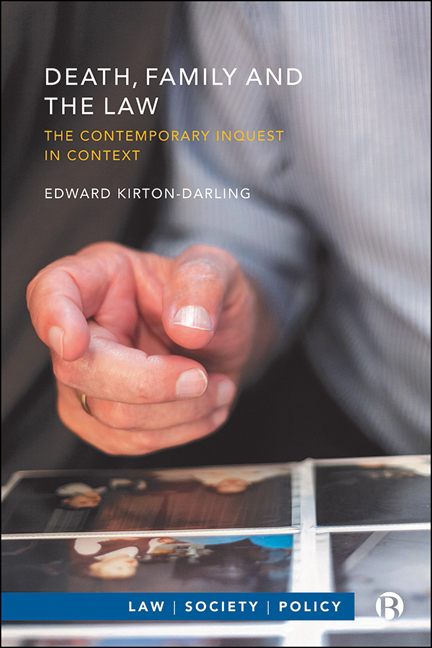Book contents
- Frontmatter
- Contents
- Acknowledgements
- Series Editor’s Preface
- 1 Death, Family and the Law
- 2 Accountability and Authority in the Historical Jurisdiction
- 3 Accountability Reconceived
- 4 First Contact and the Next of Kin
- 5 Dignity, the Family and the Body
- 6 Family in the Driving Seat
- 7 The Public(?) Hearing
- 8 Reimagining the Inquest
- Bibliography
- Index
3 - Accountability Reconceived
Published online by Cambridge University Press: 08 October 2022
- Frontmatter
- Contents
- Acknowledgements
- Series Editor’s Preface
- 1 Death, Family and the Law
- 2 Accountability and Authority in the Historical Jurisdiction
- 3 Accountability Reconceived
- 4 First Contact and the Next of Kin
- 5 Dignity, the Family and the Body
- 6 Family in the Driving Seat
- 7 The Public(?) Hearing
- 8 Reimagining the Inquest
- Bibliography
- Index
Summary
Introduction
In Chapter 2, I suggested that the participation of the community (including but not limited to the declaration of deodand) and the notification which called the community to take part were important characteristics of the historical inquest jurisdiction. These two elements – notification and enabling participation – can be understood as legal devices and are practices which have re-emerged in the context of the role of the family in the contemporary inquest. In this chapter, I argue that they are constitutive elements of the contemporary jurisdiction and can provide a basis for a conceptual understanding of an inquest law in which the bereaved are at the centre.
To explore this issue, this chapter examines accountability and authority in the shifts from the historical, to the modern, to the contemporary inquest. These are not definitive, clear-cut periods of time, but are instead ways to characterize the contested, contingent and changing nature of the inquest over time.
The chapter is divided into five parts. It opens by focusing on the modern inquest and the shifts which defined it as a modern system, before moving to explore the changes which characterize the contemporary jurisdiction. In this analysis, I return to examine the ways in which Morgan's (2006) discussion of technocratic and community forms of accountability assist in understanding the changes in the inquest. Focusing on the family, I turn to examine the contemporary jurisdiction in more detail, with particular analysis of notification, the expansion of the category of family and the participation of family – in particular, the basis for family being involved and able to ask questions during the inquest.
The modern inquest: important, limited and factual
The traditional account of authority in the modern inquest focuses on the legal authority and wide discretion of the Coroner. This approach emphasizes the legislation, precedent, guidance and best practice which underpins (and, to some extent, directs and constrains) the work of the Coroner, who acts to answer the four questions of who the person was, and how, where and when they died (see, for example, Thurston 1976; Dorries 2014; Matthews 2020). In the classic statement of the law, in 1994, the then Master of the Rolls Thomas Bingham declared that ‘an inquest is a fact-finding inquiry conducted by a Coroner, with or without a jury, to establish answers to four important but limited factual questions’.
- Type
- Chapter
- Information
- Death, Family and the LawThe Contemporary Inquest in Context, pp. 49 - 71Publisher: Bristol University PressPrint publication year: 2022



